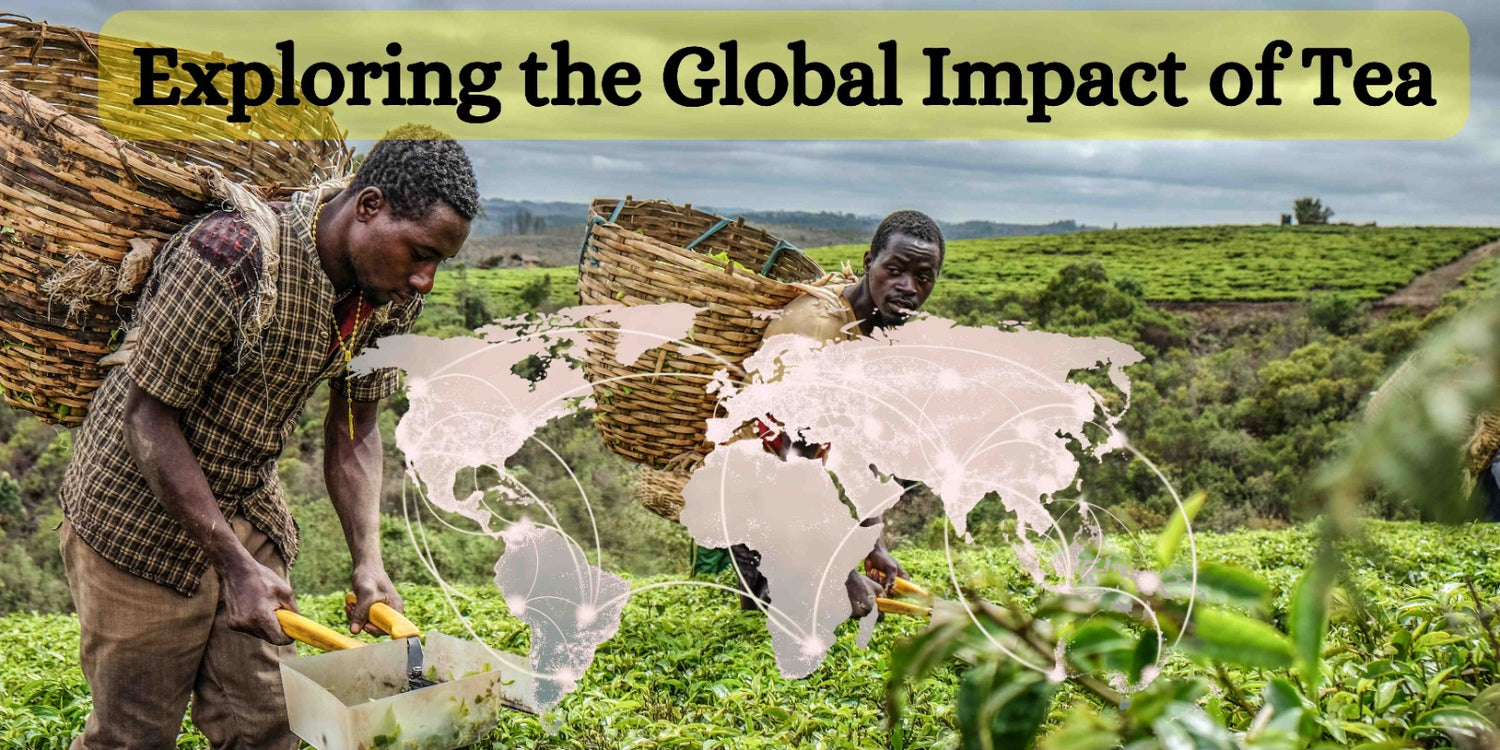As we embark on this exploration of the profound impact of tea across the globe, it is essential to appreciate the beverage not merely as a refreshment but as a cultural artifact, a health elixir, and an economic powerhouse. Originating in the East, tea has traversed continents, permeating various cultures, influencing health practices, and contributing significantly to economies. Its journey from a humble leaf to a globally revered drink encapsulates tales of tradition, wellness, and prosperity. This narrative seeks to unfold the many layers of tea's influence, revealing its historical roots, cultural significance, health benefits, and economic value. By delving into the essence of tea, we uncover not just the beverage itself but the stories and traditions it carries with it.
Historical significance of tea in different cultures
Tea's origins can be traced back to ancient China, where it was not only a beverage but a medicinal concoction. According to legend, Emperor Shen Nong discovered tea when leaves from a wild tree blew into his pot of boiling water. This serendipitous discovery would mark the beginning of tea's infusion into Chinese culture and its eventual spread across the world. In China, tea became intertwined with philosophy, particularly through the works of Lu Yu, whose treatise "The Classic of Tea" laid the foundation for the cultural ceremony of tea drinking.
As tea ventured beyond China, it found different receptions and roles within various cultures. In Japan, tea was elevated to an art form through the Chanoyu, the Japanese tea ceremony, which encapsulates Zen Buddhist philosophies and the principles of harmony, respect, purity, and tranquility. Meanwhile, in Britain, tea became a social beverage, around which the ritual of afternoon tea emerged, a practice that reflected class and social status.
India, with its rich history of tea, incorporated the beverage into its traditions, giving birth to the masala chai, a spiced tea that has become synonymous with Indian culture. Each of these cultures not only adopted tea but also adapted it, infusing local flavors, traditions, and meanings, thus contributing to the rich, diverse tapestry of global tea culture.
Cultural rituals and traditions surrounding tea
Tea rituals around the world are as varied as they are symbolic. In Morocco, the preparation of mint tea is a gesture of hospitality and friendship, performed with great care and artistry. The tea is poured from a height to create a foam, a practice that is both an art and a technique, symbolizing the generosity and skill of the host.
In Russia, the samovar, a unique tea-brewing vessel, is central to the tea-drinking experience. The samovar is not merely a tool for brewing tea but a focal point around which families and friends gather, symbolizing warmth and community. The Russian tea culture blends the robust flavors of their tea with sweet accompaniments, creating a convivial atmosphere of sharing and warmth.
The British afternoon tea, with its array of dainty sandwiches and pastries, is a testament to the social aspect of tea drinking. It evolved from a simple meal to an elaborate social event, reflecting the customs and values of British society. This ritual underscores the importance of tea as a social lubricant, bringing people together in a shared experience of leisure and pleasure.
Tea's impact on health and well-being
The health benefits of tea have been recognized since ancient times, with modern science providing evidence to support these claims. Tea, particularly green tea, is rich in antioxidants, which combat free radicals and reduce the risk of chronic diseases. These antioxidants, notably catechins, have been linked to heart health, with studies suggesting that regular tea consumption can lower the risk of heart disease.
Tea also plays a role in mental health and well-being. The amino acid L-theanine, found in tea, has been shown to have a calming effect, reducing anxiety and improving focus and concentration. This makes tea not just a physical health tonic but also a mental health elixir, offering a moment of calm and clarity in our often hectic lives.
Beyond its physical and mental health benefits, tea contributes to well-being through the rituals and ceremonies built around it. These rituals, emphasizing mindfulness and presence, offer a respite from the fast pace of modern life, fostering a sense of peace and well-being.
Economic importance of the tea industry
The tea industry is a significant contributor to the global economy, providing livelihoods for millions of people worldwide. From the tea plantations to the retail shelves, the journey of tea encompasses a wide range of economic activities, including cultivation, processing, packaging, and trading. The industry not only offers employment but also contributes to the GDP of several tea-producing countries.
The export of tea plays a crucial role in the economies of countries like China, India, Kenya, and Sri Lanka, where tea is one of the primary agricultural exports. The global demand for tea drives the export market, with specialty teas and organic teas gaining popularity, reflecting changing consumer preferences and a willingness to pay premium prices for high-quality products.
Moreover, the tea industry stimulates economic activity in related sectors, including tourism, retail, and hospitality. Tea plantations often become tourist attractions, offering visitors an insight into the tea-making process and contributing to local economies through tourism-related revenue.
Tea production and trade around the world
Tea production is a complex process that requires knowledge, skill, and the right environmental conditions. The main tea-producing regions are in Asia, Africa, and South America, each offering unique varieties and flavors of tea, shaped by the local climate, soil, and cultivation practices. China and India are the largest producers of tea, with Kenya leading in the production of black tea for the global market.
The tea trade is a global enterprise, with teas from different parts of the world finding their way to markets far and wide. The international tea market is competitive, with countries vying for market share in both traditional and emerging tea-consuming markets. The evolution of consumer preferences towards specialty teas has led to diversification in the tea industry, with producers experimenting with different blends, flavors, and production methods to cater to a discerning global clientele.
Sustainable practices are increasingly becoming a priority in tea production, with consumers and producers alike recognizing the importance of environmental conservation in the sustainability of the tea industry. This shift towards sustainability is reshaping the tea production landscape, promoting practices that ensure the long-term viability of the tea industry.
Sustainable tea farming practices
Sustainability in tea farming involves the adoption of practices that are environmentally friendly, economically viable, and socially equitable. These practices include organic farming, which eschews the use of synthetic fertilizers and pesticides, promoting biodiversity and soil health. Integrated pest management (IPM) strategies are also employed to minimize the impact on the environment while ensuring crop health.
Water conservation is another critical aspect of sustainable tea farming, with efficient irrigation systems and water management practices being implemented to minimize water usage. The conservation of natural habitats and the protection of wildlife are also integral to sustainable tea farming, ensuring that tea plantations coexist harmoniously with their natural surroundings.
Fairtrade practices play a crucial role in the social aspect of sustainability, ensuring that workers on tea plantations are paid fair wages and work in safe conditions. These practices not only contribute to the well-being of the workers but also the quality of the tea, as happy and healthy workers are more likely to take pride in their work, producing a better product.
Tea tourism and its contribution to local economies
Tea tourism is an emerging segment of the tourism industry, offering visitors a unique insight into the world of tea. From plantation tours to tea-tasting sessions, tea tourism provides an immersive experience, allowing tourists to learn about the history, culture, and tea production. This not only enriches the tourist experience but also contributes to the local economy through the creation of jobs and the generation of revenue.
Tea plantations, with their scenic beauty and tranquil ambiance, have become popular tourist destinations, attracting visitors from around the world. These plantations often offer accommodations, dining, and recreational activities, transforming them into self-contained resorts that offer a holistic experience of tea culture.
The benefits of tea tourism extend beyond the economy, fostering cultural exchange and promoting awareness of sustainable farming practices. Visitors leave with a deeper appreciation of tea, its cultural significance, and the importance of sustainability in its production, contributing to a global community of informed and conscious tea consumers.
The future of the tea industry
The tea industry stands at a crossroads, facing challenges such as climate change, shifting consumer preferences, and the need for sustainable practices. Yet, within these challenges lie opportunities for innovation and expansion. The future of the tea industry lies in its ability to adapt, embrace sustainable practices, explore new markets, and cater to the evolving tastes of consumers.
Technological advancements in cultivation, processing, and packaging offer the potential to improve efficiency and sustainability, reducing the environmental footprint of tea production. The growing interest in health and wellness presents an opportunity for the tea industry to highlight the health benefits of tea, tapping into the demand for natural and functional beverages.
As the global community becomes more interconnected, the cultural exchange facilitated by tea offers a pathway to mutual understanding and cooperation. The tea industry, with its rich heritage and global reach, is well-positioned to play a significant role in fostering a more sustainable, healthy, and connected world.
Conclusion: The enduring legacy of tea
The journey of tea from a wild leaf to a global phenomenon is a testament to its enduring appeal and significance. Tea has woven itself into the fabric of cultures, contributed to the health and well-being of millions, and played a vital role in the economies of nations. As we look to the future, the legacy of tea continues to evolve, shaped by our collective efforts toward sustainability, health, and cultural appreciation. In every cup of tea, we find not just a beverage but a reflection of our world, rich in history, diversity, and potential. The global influence of tea is a story that continues to unfold, inviting us to partake in its next chapter.




